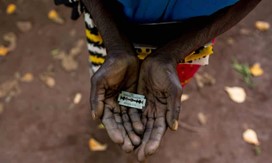Takes from the US Human Rights Report on Liberia

By Seltue Robert Karweaye Sr.
On August 12, 2025, the State Department published its detailed Country Reports on Human Rights Practices for Liberia, which meticulously covered events and issues from the year 2024. The report highlights a troubling pattern of disregard for the rule of law in Liberia, specifically emphasizing the alarming number of detainees who remain incarcerated for extended periods without being brought to trial. This situation stems from systemic failures within the judicial and law enforcement systems.
According to the U.S. government’s comprehensive annual report, approximately 60 percent of pretrial detainees, with a significant focus on those facing felony charges, are held for over 180 days—far surpassing the legal limit of two court terms without a hearing. The report underscores that while Liberian law mandates the dismissal of cases that are not prosecuted within this timeframe, such case dismissals are “rarely” enacted, making this a prevalent and concerning abuse of legal rights.
To further illustrate the systemic failures endemic to the justice system, the report highlights a specific high-profile case that gained considerable attention. In November, a judge from a Monrovia criminal court publicly reprimanded prosecutors from the Ministry of Justice for their inadequate handling of the case involving Ibrahim Kalil Cherif, a Guinean national accused of conspiring to orchestrate a coup. Cherif was initially detained by officials from the National Security Agency without formal charges for several days, during which time he was subjected to uncertain conditions and a lack of legal representation.
Following this period of unlawful detention, Cherif was subsequently transferred to prison. However, in a surprising turn of events, he was later removed from prison without any court order and handed over to Guinean authorities at their request. The Liberian government defended this controversial action as a necessary measure for national security, disregarding legal protocols. In response to these actions, the judge threatened to hold the Justice Ministry in contempt of court, openly criticizing the government’s handling of the case before it was ultimately closed, further highlighting the ongoing issues within the country’s judicial process.
The U.S. Country Reports on Human Rights Practices provide a deeply unsettling overview of the human rights situation in Liberia. The latest report identifies several serious human rights violations occurring in the country during the review period, including credible reports of arbitrary or unlawful killings, which raise grave concerns about the rule of law and the protection of life. Additionally, it documents instances of torture or cruel, inhuman, or degrading treatment, alongside reports of arbitrary arrests or detention, highlighting a pattern of abuse by authorities.
The government’s actions have severely restricted freedom of expression and media rights, exposing journalists to violence and threats, as well as censorship that curtails public discourse. This environment of fear extends to other areas, as the report indicates widespread trafficking in persons, which reflects a failure to protect vulnerable populations. Moreover, there are systematic limitations on workers’ freedom of association, undermining labor rights and the ability of individuals to organize for better working conditions.
This comprehensive report critically evaluates the status of Liberia under President Boakai, effectively debunking many of the administration’s claimed accomplishments, particularly in the domains of anti-corruption efforts and public safety. It casts a spotlight on the ongoing abuses, persistent impunity, and entrenched corruption that diminish the rights and freedoms of Liberians.
As mandated by Congress since the 1970s, the annual human rights report serves not only as a reflection of the current state of human rights in various nations but also as a crucial tool for shaping U.S. foreign policy. The findings will significantly influence the nature and extent of the foreign aid, security assistance, and trade agreements the U.S. is willing to extend to Liberia.
Although the US Department of State may have framed discussions around these issues in diplomatic language, it is clear that the U.S. harbors significant concerns regarding the escalating security challenges within Liberia. The urgency of the situation necessitates accountability and reform to restore trust in governance and uphold the human rights of all Liberians. I rest my pen.



















